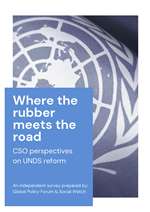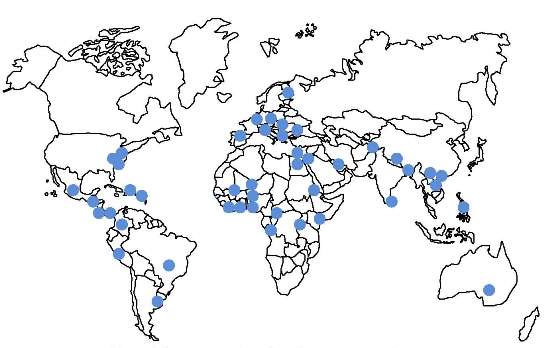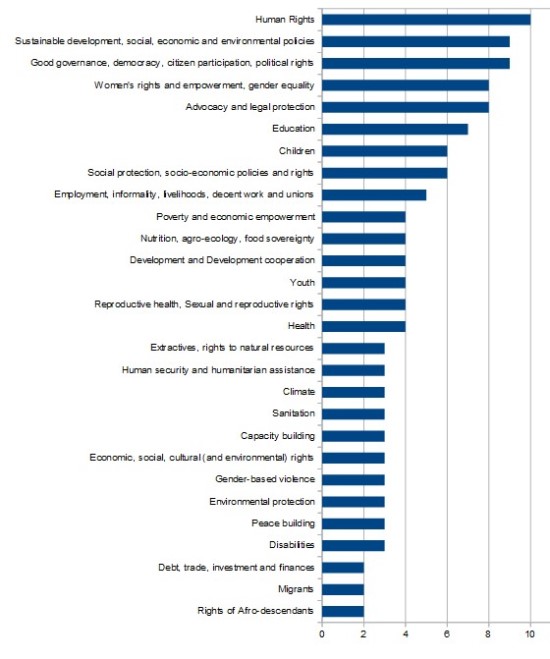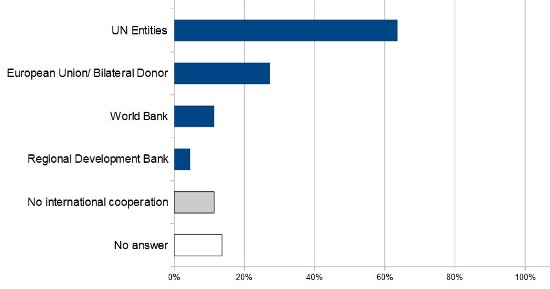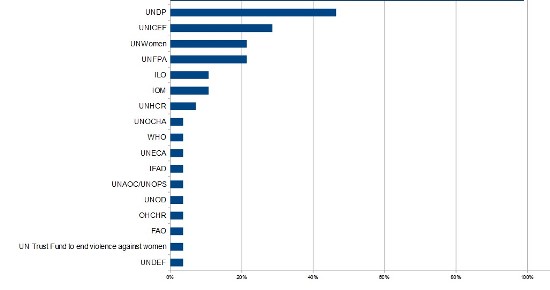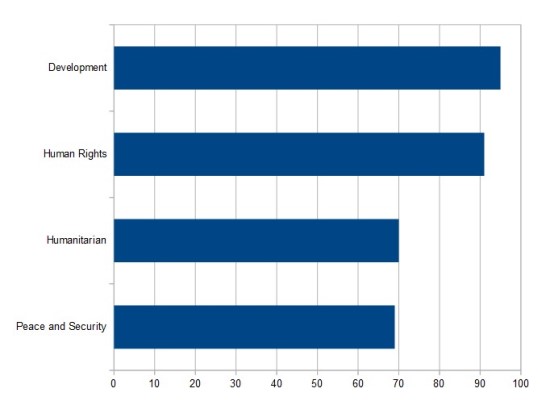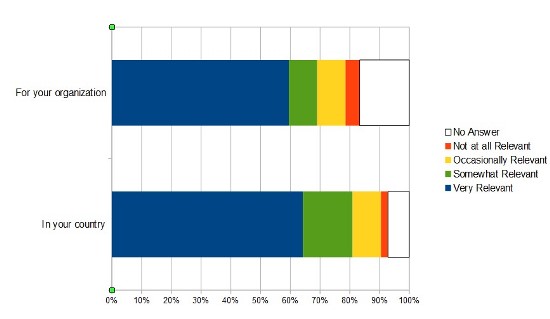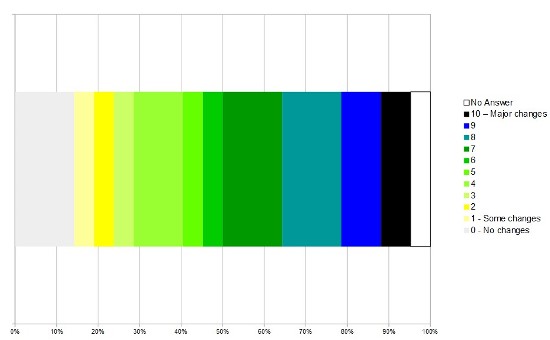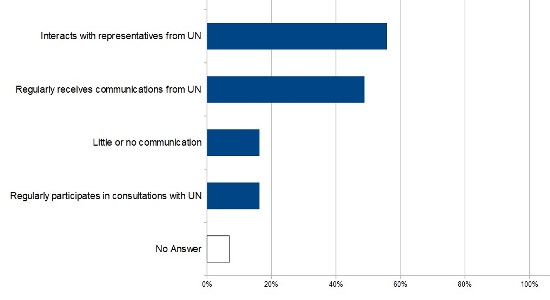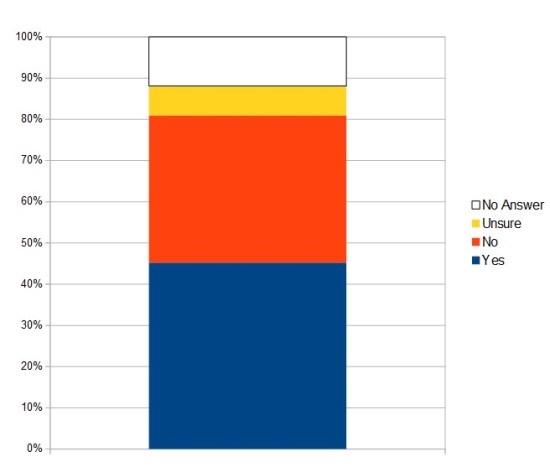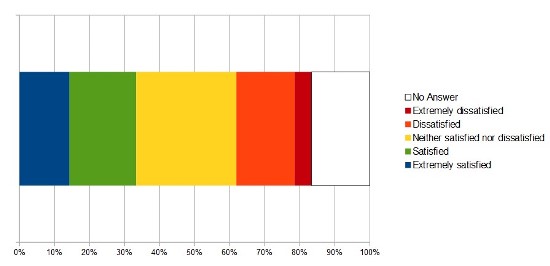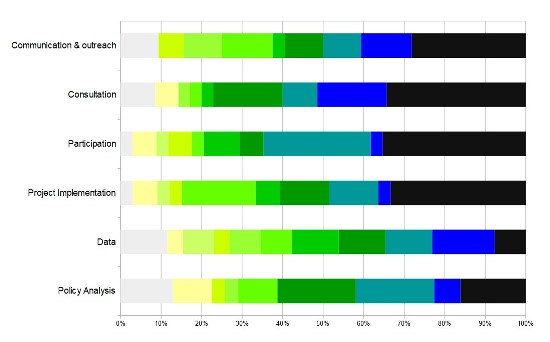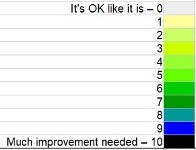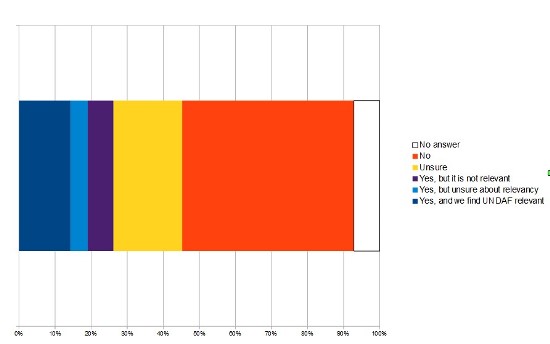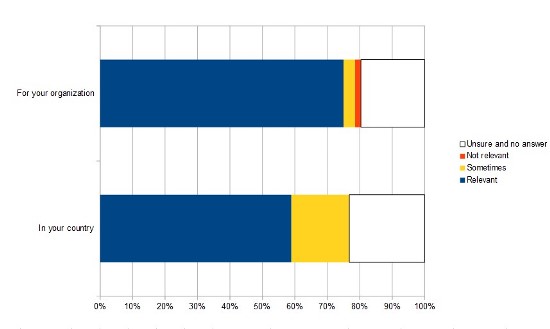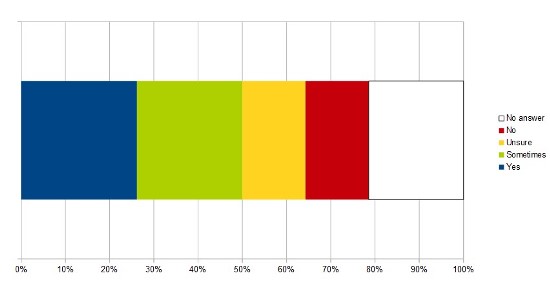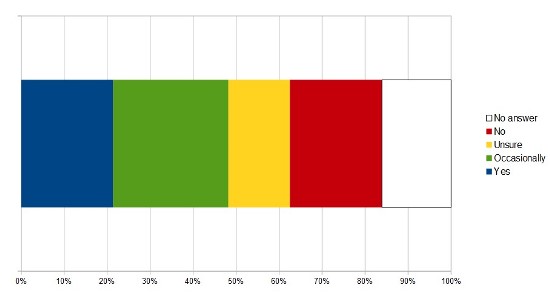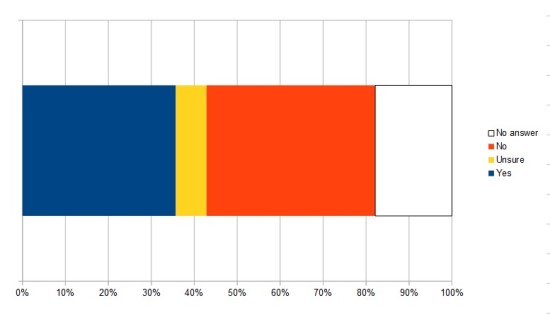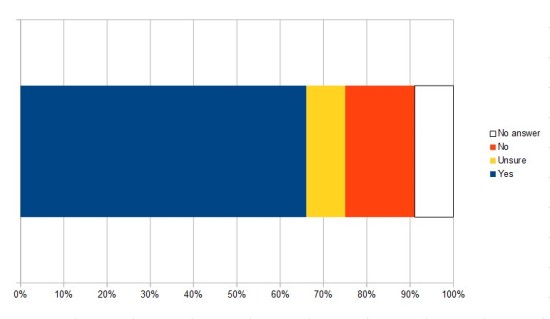Report “Where the rubber meets the road”. CSO perspectives on UN reform
Published on Mon, 2021-02-01 14:24
A survey among CSOs in “programme countries” evidences a very high level of commitment to UN values and principles, much dissatisfaction with the actual operations at country level and articulation of areas for improvement. For a number of CSOs, the UN system is appreciated for its inspiration, legitimization and promotion of the values they stand for, but is also viewed as a competitor for funds and influence, often displacing the social sector instead of building it. And frequently it is seen as both at the same time. Download the survey report here and the Annex here. Report “Where the rubber meets the road”CSO perspectives on UNDS reformAn independent survey prepared by: Global Policy Forum & Social Watch III. Perceptions of the UN system Graphs & TablesFigure 1: Approximate location of survey respondents Figure 2: Priority issues identified by respondents from programme countries Figure 3: International cooperation partners of survey respondents Figure 4: UN entities having implemented projects with survey respondents Figure 5: Priorities among UN pillars Figure 7: Perception of changes in the UN at country level Figure 8: Modalities of interaction with the UN Figure 9: Interactions with the UN Country Team and/or Resident Coordinators Figure 10: Degrees of satisfaction with the UNCTs Figure 11: Areas of the UNCT that need improvement Figure 12: Knowledge and relevance of UN Country Framework Figure 13: Relevance of the 2030 Agenda/Sustainable Development Goals (SDGs) Figure 14: Perception of impact of 2030 Agenda in country relations with the UN Figure 15: Voluntary National Review (VNR) consultations with civil society Figure 16: Respondent participation in VNR process Figure 17: New partnerships as a result of the 2030 Agenda/SDGs How inclusive is UNDS reform?On 31 May 2018 the UN Member States adopted a resolution (A/RES/72/279) to reposition the UN development system (UNDS) and the UN Secretary-General spelled out its significance:
This consensus decision was the result of five years of expert group meetings, many reports, and multiple informal and formal sessions. It also came two- and one-half years after the adoption at the highest political level of the 2030 Agenda for Sustainable Development. Unlike previous reform efforts that were limited to administrative and “internal” UNDS functioning, the Member State directive was unequivocal in calling for the repositioning of the UNDS in the direction of sustainable development objectives and it put in place major UNDS restructuring for system-wide, value-added UN operations, especially at the country level. While civil society organizations (CSOs) are repeatedly recognized as key players in advocating for and achieving UN goals, they are rarely consulted and engaged in UN reform efforts. Global Policy Watch has conducted an independent survey of CSOs with commitment and experience of working primarily in programme countries on their knowledge and understanding of the reform results. The results presented in this report evidence a very high level of commitment to UN values and principles, much dissatisfaction with the actual operations at country level and articulation of areas for improvement. For a number of CSO respondents, the UN system is appreciated for its inspiration, legitimization and promotion of the values they stand for but is also viewed as a competitor for funds and influence, often displacing the social sector instead of building it. And frequently it is seen as both at the same time. Despite substantial emphasis on partnerships including with civil society, the survey results illustrate limited and uneven engagement between CSOs and UNCTs. Results indicate that CSOs in programme countries are largely unaware of the existence of the UN Sustainable Development Cooperation Framework and only a minority are regularly engaged with their country’s UN Resident Coordinator. The organizations consulted believe the UN is relevant and they find the 2030 Agenda for Sustainable Development even more relevant. Their work is focused on achieving the Sustainable Development Goals (SDGs) in a variety of ways, including establishing new partnerships and participating in the political process of assessment. Yet, those partnerships rarely include the UN. Or, inversely, the UN country teams do not include independent CSOs in the partnerships they form. Similarly, when the official processes to monitor progress on the SDGs do not accommodate them, which seems to be in a majority of the cases, they find or create initiatives to voice their own conclusions and participate in the national, regional and global debates. Barbara Adams and Roberto Bissio I. The SurveyMember States launched the latest iteration of reform of the UN Development System (UNDS) in 2018 with the adoption of A/RES/72/279. This reform to the UNDS comes as part of a wider reform of all three UN pillars: Human Rights, Development, Peace and Security. More ambitious than many other reform rounds, its timing and objectives also address the importance of re-purposing the UNDS as a key contributor to the 2030 Agenda for Sustainable Development and the achievement of the SDGs. As a result of the UNDS reform process, the UN architecture and system-wide activities are set against a changing landscape at the international, regional, national and local levels. The reform process includes among its primary aims: strengthened in-country planning, including reinvigorating the Resident Coordinator system, revamping the regional approach and in-country programming and enhancing multi-stakeholder participation. In his 2020 report on UNDS reform progress, UN Secretary-General António Guterres stated:
What do people think about these key objectives? Are they being met? Is the UN as effective and relevant as it can be? Does the UN truly serve the people in their organizational contexts? To answer these and other questions, Global Policy Watch --a joint initiative of Global Policy Forum and Social Watch-- organized a survey among local civil society organizations from around the world. A questionnaire was distributed to members of the Social Watch network, the Women's Major Group, the International Disability Alliance (IDA) and national organizations that have been directly or indirectly working with the UN. In turn, some of these groups further disseminated the questionnaire to colleagues and partners. The survey was conducted online over the period 1 – 20 December 2020. II. The RespondentsThe objective of the survey was to explore CSO perspectives on UNDS activities in countries with a regular UN programme presence (UN Resident Coordinator, Multi-country Office and UN Country Team). It received 44 respondents from “programme”countries. Of those, 41 responses came from national or sub-national organizations, and three came from regional organizations in the global South (in Africa, Latin America and the Arab region). Further, the survey received 14 responses from organizations based in countries where no UN Resident Coordinator is accredited. These include: seven replies from Western Europe, three from the United States, two from Central and Eastern Europe and one each from Australia and Puerto Rico. As the focus of this survey concerns the relationship between UN Country Teams and civil society, the analysis enclosed within refers primarily to the responses from programme countries. However, since the 2030 Agenda and the Voluntary National Reviews of its implementation are universal, when relevant, comments from “non-programme” countries are included, with identification of their origin. Figure 1: Approximate location of survey respondents
Priority IssuesWhen participants were asked to define freely their priorities, a great diversity of areas was represented. Among programme countries, human rights was mentioned the most -by a total of 10 respondents, followed by sustainable development, democracy and gender-related concerns. None of the organizations mentioned only a single issue. Figure 1 below shows all priority areas of work mentioned at least twice. Figure 2: Priority issues identified by participants, grouped and sorted by number of mentions. Since the themes were self-described by respondents, their definition might differ or similar issues might be identified under different labels
The issues mentioned only once were (in alphabetical order): Africa, Anti-corruption, Body autonomy, Business and human rights, Community development, Cultural heritage, Defense of national territory, Emergency response, Right to the city, Rights of minorities/diversities, Sensitization, Tax justice, Transparency and Youth. International CooperationA total of 33 respondents (75% of the total from programme countries) are or have been involved in project implementation with international development agencies. Two other respondents signaled that they would like to have such involvement. A total of 28 respondents have implemented projects with support of UN entities, 12 have been supported by the EU or bilateral donors, 5 by the World Bank and 2 by regional development banks. Figure 3: International cooperation partners of survey respondents (as percent of the total respondents from programme countries). The totals exceed 100% because several organizations have worked with more than one category of development agency.*
Out of the 28 respondents that have implemented projects with UN agencies, 13 (46%) did so with UNDP, eight with UNICEF, six each with UNFPA and UN Women, three with IOM & ILO, two with UNHCR and one each with the UN Trust Fund to End Violence against Women, FAO, OHCHR, UNOD, UNAOC/UNOPS, IFAD, UNECA, WHO and UNOCHA. Figure 4: UN entities having implemented projects with survey respondents (as percent of total survey respondents in programme countries that declare partnerships with the UN). The totals exceed 100% because several organizations have worked with more than one UN entity.
III. Perceptions of the UN SystemCoherence with UN PillarsWhen asked about their own priorities in relation to the three UN pillars (Human Rights, Development/Humanitarian, Peace and Security), respondents ranked Human rights and Development highest, consistent with responses in “Priority Areas". It is worthwhile to note—as the graph below shows- that all UN pillars were assigned very positive values in the mean of the responses (see the technical details in the Annex). Figure 5: Priorities among UN pillars, as ranked (from 10 to 100) by survey respondents
Almost half of the respondents commented on the UN pillars, evidencing their interest. Some organizations highlighted the interconnection between the pillars “because development leads to better enjoyment of human rights and to peace and security”. Another respondent called for “the above pillars [to be] more linked together in the work of UN”. A regional network from the Middle East highlighted the interconnection arguing that “the region is facing tremendous developmental challenges related to conflicts, authoritarian regimes, high concentration of refugees, failure of economic and social policies and shrinking civic space. This context requires changes in the approaches and shift in policies. UN interventions in the region are important in terms of engaging different stakeholders in dialogues around the topics, but the approaches are very much considerate of the priorities of States, which makes the discourse moderate.” An international women's organization commented that “while none of the pillars can stand on its own, the economic pillar is often the one that NGOs pay the least attention too. Social is always front and center especially for a large women's organization like I represent and the environment pillar has really been embraced by the younger generations .. but sadly it is only now that NGOs like mine are beginning to pay more attention to this pillar” (the economy). On Peace and Security An African organization argued that this pillar should be kept “at any price” because “development is not possible without it”. An organization focusing on people with disabilities wrote that “peace and security is very important” since “war and unrest fabricate persons with disabilities”. Similarly, a local organization working on access to water witnesses that in areas of conflict “many women and children do not have access to basic health care or safe water”. An Eastern European organization considers that “peace and security, perhaps inevitably, is more politicized”, and thus “probably more difficult to deal with”. On the other hand, an organization from Southeast Asia comments that, since “peace and security is not the main issue in [our country], NGOs' involvement is not essential”. On Human Rights An Eastern European organization commented that “We very much rely on the Human Rights pillar and we would like to see it reinforced, instead of what we are witnessing- attempts for weakening it”. An organization working on disabilities commented: “Some agencies, notably some more than others, simply do not understand the Convention on the Rights of Persons with Disabilities” and suggested that “some of the staff should be transferred to other areas if they do not understand the rights of persons with disabilities.” An organization from Central America demands “a gender and intersectional perspective” in human rights approaches, so that they reach the most vulnerable. On Development The Development pillar is seen by an organization in the Middle East as needing a reassessment “as the current approach has proven that it could not end hunger”. A local women's organization from Africa observed that, because of it being “linked to the annual increase in the Gross National Product (GNP), development favours the economic to relegate social issues and the fair distribution of income among the inhabitants of the same country to the background. … Since underdevelopment, is essentially the result of a situation of domination and exploitation, economic growth does not necessarily imply social progress”. With regard to humanitarian assistance/interventions, an organization from Southeast Asia comments: “Humanitarian activities have been the most important issue for all NGOs at some point in time. With [the country] reaching the middle-income status, NGOs' priorities have shifted to other areas, but humanitarian projects remain high on the agenda in remote parts of the country, in the areas affected by natural disasters and among marginalized populations.” How relevant is the UN?When participants in the survey were asked about the relevance of the UN in their countries and for their organizations they responded as shown. Figure 6: Relevance of the UN system (as percent of responses from programme countries)
The UN was deemed as “very relevant” by an absolute majority of the respondents, both in terms of relevance in the country as well as for the respondent's organization itself, with a slightly less positive appreciation in the latter. Comments about relevance A local organization working in conflict areas in Africa commented that “the beneficiaries of UN responses on sustainable development and humanitarian assistance bear witness [of UN relevance] during our monitoring activities in the field”. Nevertheless, another local African organization, also from a country in conflict, commented that “the impact of the UN is not tangible” and that “there is no real collaboration with NGOs because they are concentrated on the State”. Another African organization complained that the projects they submitted were not funded, but still found the UN “occasionally relevant” in the country, for its participation in electoral processes. An Asian children's organization found the UN very relevant because “we count on the cooperation and leadership of UNICEF and UNDP to help shape policy reforms in the areas of education, children's rights and social protection”, while “ILO has also been very helpful in advancing discussions and programmes against child labor and the promotion of decent work esp. for the young people.” A local coordinating body for foreign NGOs operating in another Asian country reports that “the UN has always played a significant role, ranking highly in influencing the Government and often leading policy dialogues, while connecting with other development partners”. A CSO organizer in a conflict country that ranks among the major receivers of humanitarian assistance, on the other hand, found the UN “relevant in terms of spending funds from different donors”. Yet, “It is the biggest recipient of international funds but has little impact on the lives of people (except, UNICEF).” In a Central American country, a group linking CSOs with parliamentarians reports that “in spite of the extreme right accusing the UN of interfering in internal politics, the UN has enormous prestige in the country”. Yet, an organization working on disabilities in the same country thinks that “due to its relevance, promoting the rights of persons with disabilities should be in a higher priority for the UNCT. Guatemala was chosen as one of the pilot countries for the implementation of the United Nations Disability Inclusion Strategy (UNDIS) and despite this fact, some of the UN agency representatives and staff do not understand the Convention on the Rights of People with Disabilities (CRPD), and do not practice its principles, issues such as accessibility are ignored, no need to mention other issues that require more complex understanding.” Perception of changes in UN performance at the country levelParticipants in the survey were asked to grade, on a scale of 0 to 10, their perception of changes in the UN country performance in the last two years, which would presumably result from the reform process of the UN system started in late 2017/early 2018. The replies from countries with a UN Country Team and Resident Coordinator (programme countries) show a great variety of perceptions, ranging across all the spectrum of possible replies. Ratings of 0 (no changes perceived) or 1 (some changes) were selected by 19 percent of the respondents, while 17 percent selected 9 or 10 (major changes). Figure 7: Perception of changes in the UN at country level, graded from 0 to 10. The width of each bar represents total percentage for that response.
Comments about UN performance changes Many respondents commented on their ratings. Among those that replied “no changes” most of the comments are critical: “No tangible results, the UN only does reports” (African NGO) . “In terms of CSO engagement, we think there is no progressive change in the UN country system and even, it is getting more faded, when CSO financing, consultation and partnership is considered” (NGO in a country in conflict in Central Asia). “My understanding is that the UN is working only for its bureaucratic interest, hardly for a mandate, especially not for human rights and sustainable peace” (Civil society coalition in South Asia). “There is not really much visibility of the UN for us other than in times of an emergency. Not much engagement in the usual spaces where we operate. It seems that the UN works with Government on its own agenda” (NGO in Southeast Asia). For one respondent “no changes” is not a critical assessment, since “the UN remains dedicated and actively involved in [the country]'s development, retaining its key role in all major initiatives at the county level” (NGO coordination in Asia). Among those perceiving minor changes (1 to 4 ranking) the comments range from recognition to demands of more efforts: From an Asian country in conflict with important UN involvement, a respondent comments, “The UN system is losing its credibility among donors and government. It has been highly politicized and has failed to play an anchoring role in supporting the SDG agenda.” An African respondent observes that “from what I hear the government pays less attention to what the UN agencies, especially the UNDP try to lead on”. “The UN is making efforts to work more on the issues of sexual abuse and exploitation” (African NGO). “The UN should be more open and lead more collaboration with NGOs to create a bigger impact from the grassroots to central level” (NGO in Asia). “Only in terms of staff. We have not seen substantive changes in terms of agenda or modes of working” (Latin American CSO). “Since [my country] is a Net Financial Contributing Country to UN, the UN offices are very much influenced by the official policy towards the role of CSOs especially Human Rights Organizations, whose role is shrinking .The UN role is much limited to development, while human rights and democracy are absent” (Arab NGO). Comments from those perceiving changes (rankings of 7 to 10) showed a variety of UN responses: “[The changes] depend on persons in charge of critical roles. Since we have a Resident Coordinator we improved” (Women's organization in South America). “They are reaching out more to the initiatives of social organizations” (Latin American NGO). “The goals and objectives of the programmes are better defined. Nevertheless, there is less participation from CSOs in the implementation of their programmes” (Central American organization). “UN agencies have been a lot more visible. They have increased engagement with CSOs” (Southeast Asian NGO). “The UN has withdrawn from the political aspect of the conflict in Palestine to a more technical role of managing day to day lives of Palestinians (Bisan Centre for Research and Development, Palestine). “New positions were created (UN coordinator, Representative of S-G). The new structure has hierarchical complications. The government terminated the UNDP programmes in the ministries, after having initially proposed such a structure. We think that this model created a parallel structure, with a number of staff and consultants inside the ministries, that are not accountable to the administration, which led to a lot of tension and did not help in enhancing the efficiency of the public administration (NGO in the MENA region). “Selected CSOs have been invited by the UN Resident Coordinator to a consultation regarding the future of the UN performance. It was for the first time an opportunity to exchange experiences and views, and to provide proposals to be an active partner of the UN” (South-Eastern European organization). “There is more connection with civil society and with official policies” (Latin American organization). One African NGO appreciated “the strategy to deliver as One and the creation of a civil society facility to support the work of CSOs”. “The UN force contributed significantly to the return of peace in my country after a long military-political crisis from 2011 to 2020. From then on the agencies of the UN system have been very efficient” (African NGO) “The UN has an important role in promoting development through the SDGs and the work of the OHCHR” (Central American NGO) Comments from non-programme countries: A Western European NGO active in development cooperation regretted “a period of distancing, promoted by the government, that led to the closure of the local offices of FAO and UN-Women. Yet, there was an important impact in the media and political circles of the reports (by special rapporteurs on HR) on migrants, working conditions, poverty, energetic inequalities and housing.” Similarly, an Eastern European women's organization detects “a process in two opposite directions: first, more UN bodies and agencies provide recommendations to our country, and at the same time a backlash does not allow for full recognition of their competence and relevance”. A Nordic NGO reports that “UNTIL and UNOPS have opened offices in the country, but their roles are not yet very clear. Support for the UN is now higher/more spoken with current government and COVID-19 has made UN more visible”. Communications with the UNWhen asked about their Interactions with the UN, more than half of the respondents from countries with a Resident Coordinator cited interacting with UN representatives and that they regularly receive information material from the UN, frequently from headquarters or specialized entities. Only 16 percent of respondents said they are regularly consulted locally and another 16 percent reported receiving little or no communication. Figure 8: Modalities of Interaction with the UN (as percent of respondents from programme countries that declare interacting with the UN). Total exceeds 100% because many respondents declared more than one simultaneously.
Comments on communication Several comments regarding UN communication were received, many of them to clarify that the communications were not with the RC but with different UN entities. ECLAC, UNECA, UNCTAD, UNDP, UNW and UNICEF were mentioned. An organization from the Arab region commented that “until the Arab Spring, in 2011, there was a close relation between the UN and the NGOs, but after that it has shrunken considerably”. An African organization reported that “sometimes access is blocked at the security gate”, while another African organization bemoaned that “generally we are only called when high level missions arrive from headquarters”. An organization from an Asian country in a conflict situation reports that the local UN Assistance Mission “is sometimes calling for meetings for the meetings sake. I haven't experienced any tangible result of their meetings”. Another organization from the same country commented: “We are in special consultative status with UN ECOSOC and receive their communication regularly. But when other UN agencies are considered, there is little or no communication from their end and sometimes we visit their websites and social media to get informed of the updates.” In Southeast Asia, a respondent organization says it “communicates and interacts regularly and frequently with the UN, and —through our support— [the UN links] with all relevant foreign and local NGOs”. In-country interactionsRespondents were asked whether or not they had worked with or been consulted by the UNCTs and/or RCs in their country context. Out of 42 respondents from partner countries, 19 had working relations or consultations with the UN locally while 15 reported none. Among the “no” answers, one explained that “we have contacted the RC but the meeting has not taken place yet”. Figure 9: Interactions with the UNCT and/or RC (as percent of programme country respondents)
When asked to say something about the nature of the joint work or consultation, respondents noted the following: “We sought out the UN Resident Coordinators office to contribute to an emergency response”. “In 2005 UNDP and UNFPA worked with us, funding our travel and in implementing projects, but since then they haven't worked with us”. “New deal, development, cooperation. South-South and triangular cooperation. Peace and security, SDGs”. “Campaign on the World We Want and other SDG-related activities”. “Preparation of VNR”. “UNICEF on child rights and protection, UN Women in relation with a project and some small gender promotion initiatives”. “In conjunction with the validation of research sponsored by UNICEF and the area based national review of social protection programmes of ILO”. “Drafting a country grant proposal to the UN Partnership on the Rights of Persons with Disabilities”. “Selected CSOs have been invited to propose future forms of cooperation”. “Work around leveraging technology for development and supporting CSOs programming using a Human Rights Based Approach.” “Intersectoral dialogue”. “A number of high-level policy dialogues and consultations on SDGs implementation and visits of the UN Special Rapporteurs on the right to food, on the right to health, and in the field of cultural rights.” “We (local representation of an international NGO) co-chaired Disaster Management Group with UN Resident Coordinator, joined UN entities in Rapid Assessment for emergency, joined UN entities on child protection, including during COVID-19”. Satisfaction with UNCTsWhen asked to rate their satisfaction with and responsiveness of their UNCTs, of the 42 respondents in partner countries, a relative majority (12 replies) positioned itself in the neutral middle. One third responded “satisfied” or “extremely satisfied” but 21 percent responded “dissatisfied” or “extremely dissatisfied”. Figure 10: Degrees of satisfaction with UNCT expressed by respondents from programme countries
Comments of those “satisfied” with UNCTs “We affirm that they are satisfactory insofar as we work with the different agencies in the region of the Great Lakes and we find commendable interventions made for the populations in need” (local African NGO). “Our Centre and the wider foreign NGO community have frequent and productive interactions with the United Nations Country Team on number of issues (e.g., Ethnic Minorities, Human Rights, SDGs, Leave No One Behind initiative, Disaster Preparedness and Mitigation, Child Rights, Climate Change, etc.)” (Southeast Asian NGO coordination). “The RC has been quite receptive about the consultations with persons with disabilities” (Organization of people with disabilities). One organization that declared itself “satisfied”, nevertheless observed that they “have never been informed of the result of consultations or how it impacted the UN team's policy recommendations”. From those “dissatisfied” with UNCTs: “UNCT rarely consult with critical CSOs, and deal with officially approved CSOs” (Arab NGO). “Not at all satisfied sometimes you submit a project instead of answering you see the same project being carried out by a structure of their choice financed by the UNDP” (African NGO). “Not very much responsive, may be because the unstable personnel or the UNCT seems to connect when they want or are interested in some areas than responded to others' proposal or initiation” (Asian NGO). Areas for UNCTs to improveRespondents were asked about improvements needed (or not) in six areas: Policy Analysis, Data, Project Implementation, Participation, Consultation and Communication and Outreach. Across the six areas, 10-20 percent responded in the range of zero to two, indicating that everything is OK or little change is needed. Most respondents want to see improvements in all areas. “Data” was the area where the average improvement demanded was less, and also the one area with the highest number of abstentions. “Participation” and “consultation” are the areas with the highest perceived need of improvement and also those with the lowest number of respondents abstaining to give a note. Figure 11: Areas of the UNCT that need improvement. Number of replies per grade of improvement needed, with 0 meaning “it is ok as it is” and 10 for “much improvement needed”
Legend to interpret Figure 11.
Comments on areas needing improvement “The UNCT is engaging much with the government and pro-government CSOs on the account of independent CSOs, especially HROs” (NGO from the MENA region). “During policy analysis, data gathering, implementation of projects, consultation, communication, the UN should ensure inclusion/representation of persons with disabilities through the disabled people organization” (African NGO). “It is important to communicate to the country about the commitments by the government at the UN on certain policies. The country needs to develop projects to back those policies, since capacity to implement is weak, there is low institutionality and limited democratic participation” (Latin American NGO). “UN is a haven for internationals to bag beautiful salaries and danger related incentives. It is nurturing corruption within the UN system and bribes the government agencies to remain complacent about their work. It definitely requires to start from a clean slate” (NGO in a conflict country in Asia). “UN should not go for any project implementation in a country where local CSOs/NGOs are much more matured in this regard. My observation is that UN is competing with local CSOs/NGOs and trying to establish themselves as intermediary to the donors, which is not acceptable as we need sovereign and sustainable growth of local CSOs/NGOs (South Asian NGO)”. “The UN entities should consult with CSOs and NGOs, international and national, active on the ground, about the veracity and reliability of data published on the different areas of sustainable development and humanitarian actions, as these organizations are always active, even when besieged by armed groups in conflict zones” (African NGO in conflict area). “We see problems of rigidity in project implementation, as well as with the timing” (Central American organization). UN Country FrameworkAmong the respondents from programme countries, only about one fourth (26%) declared themselves to be aware of the UN Country Framework. Of these, slightly over half considered it relevant, while the rest responded they are not sure or do not consider it relevant. The only comment provided to justify this view was that “the UN role is limited to providing consultancy upon request of the government.” Figure 12: Knowledge and relevance of UN country framework (as percent of programme country respondents)
IV. SDGs & VNRsImportance of the 2030 AgendaSurvey participants were asked about the importance of the 2030 Agenda and the Sustainable Development Goals (SDGs) and their impact on their country's relationship with the UN. Figure 13: Relevance of the 2030 Agenda/SDGs in your country and for your organization (as percent of respondents from all countries: programme countries, developed countries and transition countries)
Figure 14: Perception of impact of the 2030Agenda in country relations with the UN (as percent of respondents from programme countries)
An absolute majority of respondents from all countries considers the 2030 Agenda as relevant for their countries and an even greater number considers it relevant for their organization. These percentages are higher than those of the relevance attributed to the UN in a previous question. Yet, perceptions are divided when asked about the 2030 Agenda having an impact on their country’s relationship with the UN. Comments on relevance of SDGs/VNRs “We are a very highly exposed country to humanitarian issues that are a consequence of organized crime and also to climate change. Governments have done almost nothing to address these vulnerabilities, which affect the most marginalized populations, including persons with disabilities. The UN could have a stronger role in promoting the government's accountability on these pressing matters” (Central American organization). “Yes, we strongly feel that we are part of 2030 Agenda with the leadership of our government” (South Asian organization). “There is no clear follow-up about the goals of the Agenda being met. We don't observe any significative changes in public policies in relation with the SDGs” (Central American organization). “The Goals are very important but regrettably the present and past governments have not made the necessary efforts and it is more a discourse”. (Central American organization). “The SDGs are important and my organization believes in them, promotes and demands them, but public policies in many cases are divorced from the SDGs”. (national labour organization in Central America). “The SDGs are both useful as guide in advocacy work in policy and programme implementation and for monitoring accomplishments” (Asian NGO). “A majority of the SDGs and their targets are linked with human rights obligations that the State already has, but the authorities rarely see it that way, they lack a human rights approach in many of the measures adopted to supposedly meet the 2030 Agenda” (Latin American human rights organization). “The Sustainable Development objectives are not yet observable in my country. If we consider the application of the objectives by the various governments, we can identify several flaws in the fields of poverty reduction, education, health, employment. The safety of people and their property remains a pure slogan. The national authorities competent in the execution of projects financed by UN agencies should set up financial audit mechanisms to ensure the good governance of the funds allocated for the execution of the projects because no change is perceived yet by the population” (African NGO in a country in conflict). “The 2030 Agenda and SDGs have positively impacted the country's relationship with the UN. The 2030 Agenda and SDGs are relevant to our organization because it is relevant to the majority of foreign NGOs in the country” (Coordination of NGOs in Southeast Asia). All of the countries where respondents are based have submitted at least one VNR, with the exception only of the United States. But, only 21 percent of the respondents (with a similar percentage in countries with and without Resident Coordinator) declare being aware that civil society has been consulted. Figure 15: VNRs consultations with civil society (as percent of respondents from all countries)
An even larger number answered “Occasionally”, which is far from a proper consultation, as shown by the following comments among those that answered “occasionally”: “The consultation with CSOs was limited to one day meeting dedicated to promote the government report and not to debate it or amend it”. (Arab NGO). “We are just invited through GNDR (Global Network of Civil Society Organizations for Disaster Reduction) to attend a National meeting to discuss the Annual document”. (African NGO). “Consultation was with select CSO network leads”. (Asian NGO). “The government took a lot of time (and money) in consultations, but in the end they dismissed the outcomes and hired UNDP to write a report in a contract as a consultancy”. (Latin American NGO). A participant that answered “no” commented: “The organizations requested information and held dialogues with the Ministry of Foreign Relations, and they offered to consult us about the document, but they only made it known to us once it was sent to the High Level Political Forum”. (Latin American NGO). Comments from those that answered “yes”: “Consultations with Civil Society during the drafting process of VNR have been extensive and the final report reflected inputs of Civil Society” (Asian organization). “Yes, but marginalized communities were not consulted” (Asian organization). Participation in the VNR processWhen asked about their own relation with the VNR process, over one third of the respondents declare that their organizations participated in it, even when only one fifth had declared in the previous question that the official VNR process included consultations with civil society. This shows that many organizations participated through forms other than the official process, particularly through “shadow” or “spotlight” reports. Figure 16: Own participation in VNR process (as percent of respondents from all countries)
Comments on VNR participation: “We participated through Alternative Reports but with little outreach” (Latin American Human Rights organization). “Our organization helped coordinate inputs from many foreign NGOs, which work on different SDGs and facilitated dialogues between NGOs and the Government” (from a coalition in Asia). “We led civil society process in the country and conducted Voluntary Peoples Review of SDGs and produced a civil society Spotlight Report” (Asian NGO). “Through the Child Right Working Group, where we are a core leading member” (NGO in Asia). “We submitted language stemming from a collective CSO process, and therefore there is a section in the official VNR with our inputs” (Latin American women’s group). “Not as a process, we attend sporadic calls” (Central American NGO). “We prepared a Shadow report to the VNR and presented statement at the HLPF” (Eastern European NGO). “We took part in a meeting, but VNR process was very limited and farcical” (Arab NGO). “It is a very good tool to monitor the implementation of the SDGs but we don't know how to follow up after the VNR to learn whether the comments to the delegation are or will be incorporated or used to improve the situation in the country” (Disabled people's organization). “The CSOs that participated were select network leads and not many of them. The assumption is that the network will consult their members. This does not happen all the time. I am not even sure if they are given time to consult their members” (Asian NGO). “[No participation] due to non existence of a national coordinating mechanism” (African NGO). “Not as a process, we attend sporadic calls” (Central American NGO). V. PartnershipsThe survey asked organizations about their own contributions to the SDGs and about new partnerships they may have formed, or become part of, as a result of the implementation of the 2030 Agenda. When prompted to describe their contribution to the SDGs, a women's health NGO in Asia declared that “In continuing with our mission, programmes and activities in our particular area of work, we are contributing to the overall efforts of our country to achieve these goals”. Many other comments had a similar approach. For example, a women's organization in Africa writes: “We fight against poverty, contribute to the promotion of women's rights, through the organization of information sessions and training of grassroots communities, fight against the impacts of climate change, by the organization of educational activities of young girls and rural women on the importance of the tree, and public animation”. Whatever their area of work, non-profit organizations clearly feel that by fulfilling their mandates they are contributing to the 2030 Agenda. A minority of responses finds no value-added in the SDGs. A Central American women's organization explains that “our organization is not part of the Commission that monitors the SDGs … There is not much relationship with Civil Society, little report is given of what is being done, nor does there seem to be much coordination between the different public institutions in relation to the SDGs.” Many other comments do find value and opportunity in the new agenda. Here some highlights on new initiatives or additional activities undertaken after the adoption of the SDGs and in relation with them: Promoting education/awareness We have implemented awareness campaigns in schools to explain to children the importance of the SDGs. We work for peace and security through numerous actions, we denounce the systematic use of children in armed conflicts. We are building a 100 percent ecological village and working with the marginalized Pygmy people. We also conduct awareness campaigns against gender-based violence and encourage youth to invest in agriculture to contribute to the eradication of hunger in Africa” (African NGO). We coordinate with the commission of the government as well as the UNDP in the country; we also give orientation talks and mobilization on the fundamental topics of SDGs with community-based groups” (Latin American group on migrants). “Yes, we are participating in a programme sponsored by the ILO, the international trade union confederation (ITUC) and the Workers Confederation of the Americas (CSA), but with limited human resources and programme capacity” (Latin American workers' group). “Yes but within the limits of the small margin of freedom allowed .Our role is mainly to propagate and promote SDGs at the national level and work together with regional and international networks such as Social Watch on promoting SDGs. We presented an alternative report to the government report on implementation of SDGs” (NGO in the MENA region). New PartnershipsChanging the rules Working on sustainable production as expressed in extractives, value chains and inequality and gender equality issues” (African NGO). “In the strengthening of SDG 16.4 referred to the recovery of resources through the curbing of illicit financial flows and by progressive tax systems: the contributions in the FACTI transparency panel, in the Assemblies and UN spaces; in spaces of UNCTAD and UNODC on the measurement and quantification of illicit financial flows help to impact the achievement of the SDGs” (Latin American network). Monitoring and reporting “Joining the LNOB (leave no one behind) network in the country, contributing data on youth and children at our projected areas, providing feedbacks to VNR and SDGs update reports” (local office of an international NGO in Asia). “Yes, our organization is coordinating and facilitating a civil society based SDGs National Network. Also, it is implementing SDG16+ initiative at local level. It is mostly involved in tracking progress of SDGs in the country and engaging with concerned agencies” (Asian NGO). “We played a leading role in the creation of a national Platform for the Monitoring of the 2030 Agenda (involving UNDP, the government and civil society) and we occupy an important place in the coordination of this space, which brings together a large number of social and trade union organizations” (South American NGO). “CSOs made our own analysis on 17 goals and it was included into the official VNR report this year. We are heavily involved specially from advocacy side to all kind of 2030 work” (Nordic CSO coalition). “Our organization prepared and presented a Shadow Report to the Voluntary National Review. As an ECOSOC accredited organization, and through the Women2030 project, we participated at HLPF and provided statement on behalf of national NGOs’ (Eastern European organization). “We seek to: support and strengthen the voice of CSOs in monitoring and holding government accountable for socio-economic and human rights; support the capacity of legal experts/practitioners in the enforceability of social and economic rights; raise public awareness of progress on SDGs” (African organization). Engaging with decision-makers “We interact with some ministries in order to improve regulations and impact. We have success stories with the ministries of Health, Security, and the Ministry of Women, Gender and Diversity” (South American gender foundation). “In advocacy work to promote bills in parliament in favour of development” (Central American coalition). “Our organization is contributing for the success of SDGs by pushing government and civil society to ensure inclusion in every aspect and building the capacity of DPOs, media, and general public to understand and act accordingly about SDGs relationship with disability inclusion issues” (African disabled peoples organization). “We're part of national discussions on effecting education for all and the CSO group that is monitoring the Department of Education's Last Mile Schools Programme. Ending poverty and attaining zero hunger is also the focus of our efforts as part of the network of organizations involved in an alternative budget initiative advocating for increased investments in an enhanced national social protection programme” (Foundation in Southeast Asia). Developing alternatives “Yes, we organize women in groups and cooperatives to sensitize them to produce and transform local products for sustainable development” (African organization). “We are currently campaigning for the ratification of the Escazú Agreement (Latin American and Caribbean Treaty on Civil Society access rights to information, consultation and remedy, coordinated by ECLAC) and against the environmental impact of multilaterally funded infrastructure megaprojects” (South American environmental NGO). “We are also participating in a network called Leave No One Behind (LNOB) which measures SDG's from grassroots levels and difficult to collect areas to report on progress to national levels” (NGO in Southeast Asia). New alliances in connection with the SDGsWhen asked about their participation in new alliances around the SDGs, two thirds of the respondents declare having established new partnerships, but only 10 replies mention the UN in them, and in most cases those initiatives are with UN entities at global level. In two responses the new partnership is with the UN regional commissions (ESCWA and ECLAC). Only in two countries (Argentina and Viet Nam) do respondents clearly identify new alliances with the UN locally as a result of the SDGs. In the case of Viet Nam the comments in that regard came from local offices of international NGOS. Respondents named 15 examples of new alliances around the SDGs with peers, nationally or internationally, and five examples of new working relations with the national government to implement, monitor or promote SDGs. Figure 17: New partnerships as a result of SDGs and 2030 Agenda (as percent of respondents from all countries)
VI. Final CommentsRespondents were asked, at the end of the questionnaire, to freely comment about the UN in their country, including aspects or areas that need improvement. Two thirds of the survey participants actually did so. “Engagement with CSOs” is the three-word summaryon needed improvement from a regional network, expressing the view of many others: “UN needs more engagement with civil society organizations of marginalized and vulnerable groups. Focus their activities to the demands and need of the people” (Asian campaigning group). “The poorest and most vulnerable sectors should be more involved. The population perceives it [the UN] as an upper class of diplomats that do not share with the poor peoples.” (Latin American organization) Organizations with a specific focus on some social sectors, logically demanded attention to their constituencies: “In my country UN agencies are not closely working with DPOs (disabled peoples' organizations)“ observed an African NGO. Another demanded inclusion “for people with cognitive disabilities” and an organization from Latin America concretely proposes that “persons with disabilities who are experts should be recruited as staff in order to be inclusive of them, but also in order to build capacities in mainstreaming the rights of persons with disabilities throughout the UN system”. A Central American women's group demands “that the programmes will be improved to fulfill the Decade of Afro-descendant and indigenous peoples, and in particular with women. I do not see actions that ensure significant changes in the situation of these vulnerable populations.” Yet, there are risks: “For the UN system to be successful in our countries, they must work with local grassroots organizations and not destroy them by appropriating their tasks”, warns an organization based in an African LDC. “UN offices are dependent [in my country] on government financial support and scrutiny, which hinders cooperation with independent CSOs.” (NGO in a high income developing country) “The UN should be transparent in financial and management issues. It should be locally accountable too. It should have a boundary so that UN will leave the space for civil society and not to compete or replace CSOs” (Asian CSO). “Partnerships with UN agencies usually go through UNDP. That means UNDP keeps a percentage of the funding, decides on political contracts and relations and usually is also subservient to the government. Therefore UNDP works more as an admin of funds with a complex relation to the government. In a way, it weakens the institutional capacity of the government. UN Women, by promoting women's empowerment rather than women's human rights, is also a complex partner. However, the UNCT has always pushed for the care economy agenda, and therefore has been an ally, even though they some time take the space national feminist organizations should have. They even appropriate the knowledge stemmed from feminist organizations. Successful projects are removed from NGO's hands, but then these projects are abandoned by UN Women staff for lack of proper understanding of the operation on the ground. So, again, it's a complex relation between the agency and feminist organizations” (Latin American feminist organization). Peace is essential: “UN Interventions are good although the security aspect and the tracking of negative armed forces which kill families in the east of the country remains a very worrying problem. The country has known several natural and human-made disasters in the community as in schools but so far several households victims of fires and torrential rains are not supported. The capacity building of national organizations in the pursue of their needs remains a challenge to be taken up in order to be able to contribute to the construction of a leadership within the local actors.” (local CSO in a conflict area in Africa) “The UN has been important in the defense of the peace agreement, [but] it is far from civil society and is perceived only as the executor of projects.” (NGO in South America) Human Rights are addressed from different angles in the comments: “The UN has a very problematic working relationship due to the government's troubling record in human rights violations.” (African organization in exile) “The UN Agencies accredited in [the country] and coordinated by the UNDP mostly lack a human rights approach and there should be greater interaction with the OHCHR to mainstream the approach.” (Latin American organization) “The UN in Palestine needs to take an active role in protecting the people from Israeli violations; this includes monitoring, reporting and holding duty bearers accountable. Unfortunately the UN in Palestine has given up its role and mandate of protection and upholding human rights for a more technical role of implementing projects that are done to mitigate the effects of the occupation and mostly with approval from the occupying authority.” (Bisan Centre for Research and Development, Palestine) An Eastern European organization demands “monitoring of violations of human rights by MINURSO”. And, ultimately, more reforms are needed: “The UN should set up advisory groups of a broad spectrum of types of groups to consult with ... not just the big INGOs” (Women's network). “There is regular communication with specific agencies but not so much with the UN Country Team as a whole. But what is worrying is the way international politics, conflicts between countries, play havoc on development efforts and often thwart these efforts at improving the lives of people everywhere” (Asian health organization). “The United Nations must be reformed for equality and fairness in particular the Security Council where some countries have veto rights” concludes an Asian organization. “A United Nations open to innovative ideas and willing to adapt to the social dynamics of the country, and with a clear commitment to democracy in its practical expressions. Although the UN relates mainly with the government, it must attend and accompany social processes that are the intrinsic basis of democracy” (CSO in Central America). AnnexThe survey responses in numbers The following tables detail the statistical base of the figures presented in the text. Figure 3: International cooperation partners of survey respondents (as percent of the total respondents from programme countries). The totals exceed 100% because several organizations have worked with more than one category of development agency.
Figure 5: Priorities among UN pillars, as ranked (from 10 to 100) by survey respondents
Figure 6: Relevance of the UN system (as percent of responses from programme countries)
Figure 7: Perception of changes in the UN at country level, graded from zero to 10.
Figure 8: Modalities of Interaction with the UN (as percent of respondents from programme countries that declare interacting with the UN). Total exceeds 100% because many respondents declared different interactions simultaneously.
Figure 9: Interactions with the UNCT and/or RC (as percent of respondents from programme countries).
Figure 10: Degrees of satisfaction with UNCT expressed by respondents from programme countries
Figure 11: Areas of the UNCT that need improvement. Number of replies per grade of improvement needed, with 0 meaning “it is ok as it is” and 10 for “much improvement needed” Figure 12: Knowledge and relevance of UN country framework (as percent of “programme country” respondents)
Figure 13: Relevance of the 2030 Agenda/SDGs in your country and for your organization (as percent of all respondents from all countries)
Figure 14: Perception of impact of the 2030 Agenda in country relations with the UN (as percent of respondents from programme countries)
Figure 15: VNRs consultations with civil society (as percent of respondents from all countries)
Figure 16: Own participation in VNR process (as percent of respondents from all countries)
Figure 17: New partnerships as a result of SDGs and 2030 Agenda (as percent of respondents from all countries)
AcronymsCRPD - Convention on the Rights of Persons with Disabilities CSOs – Civil Society Organizations ECLAC - United Nations Economic Commission for Latin America and the Caribbean ECOSOC - United Nations Economic and Social Council ESCWA - United Nations Economic and Social Commission for Western Asia EU – European Union FAO - Food and Agriculture Organization GA – General Assembly (of the UN) GNDR - Global Network of Civil Society Organizations for Disaster Reduction GPF – Global Policy Forum GPW – Global Policy Watch HLPF – High-level Political Forum IDA - International Disability Alliance IFAD - International Fund for Agricultural Development ILO - International Labour Organization IOM - International Organization for Migration LDC – Least Developed Country LNOB - Leave no one behind MENA – Middle East and North Africa MINURSO - United Nations Mission for the Referendum in Western Sahara MS – Member States (of the UN) NGO – Non-governmental Organization OHCHR - Office of the High Commissioner for Human Rights RC – Resident Coordinator (of the UN) SDGs – Sustainable Development Goals UN – United Nations UNAOC - United Nations Alliance of Civilizations UNCT – United Nations Country Team UNCTAD - United Nations Conference on Trade and Development UNDAF – UN Development Assistance Framework UNDIS - United Nations Disability Inclusion Strategy UNDP - United Nations Development Programme UNDS – UN Development System UNECA- United Nations Economic Commission for Africa UNFPA- United Nations Population Fund UNHCR- United Nations High Commissioner for Refugees UNICEF - United Nations International Children's Emergency Fund UNOCHA- United Nations Office for the Coordination of Humanitarian Affairs UNOD - United Nations Office on Drugs and Crime UNOPS . United Nations Office for Project Services UNTIL - UN Technology Innovation Lab UNW – UN Women - VNR – Voluntary National Review WHO - World Health Organization AcknowledgementsThis survey was designed and processed by Barbara Adams (Global Policy Forum) and Roberto Bissio (Social Watch) for Global Policy Watch. The authors wish to thank Tejaswini Vavilala at the New School for her collaboration during all stages of the process as well as her management of the New School online survey facilities. We also wish to acknowledge the contributions of Elena Marmo, Karen Judd, and all the people and organizations that contributed with their time and insights to this study. The responses and inputs of respondents were made on a not-for-attribution basis and while all efforts were made in this report to synthesize their voices accurately, no opinion shall be deemed to reflect that of an individual participant or organization unless specifically stated. The initiative is possible thanks to the support of the German Federal Ministry for Economic Cooperation and Development (BMZ). The contents of this publication are the sole responsibility of Social Watch and Global Policy Forum and can in no way be taken to reflect the views of the German Federal Ministry for Economic Cooperation and Development (BMZ). Where the rubber meets the roadCSO perspectives on UN reform: An independent surveyPublished by: Global Policy Watch
“Global Policy Watch” (GPW) is a joint initiative of Social Watch and Global Policy Forum. Authors: Barbara Adams and Roberto Bissio Note: * See in Annex the detailed statistics on which this and all other figures are based.
| |||||||||||||||||||||||||||||||||||||||||||||||||||||||||||||||||||||||||||||||||||||||||||||||||||||||||||||||||||||||||||||||||||||||||||||||||||||||||||||||||||||||||||||||||||||||||||||||||||||||||||||||||||||||||||||||||||||||||||||||||||||||||||||||||||||||||||||||||||||||||||||||||||||||||||||||||||||||||||||||||||||||||||||||||||||||

